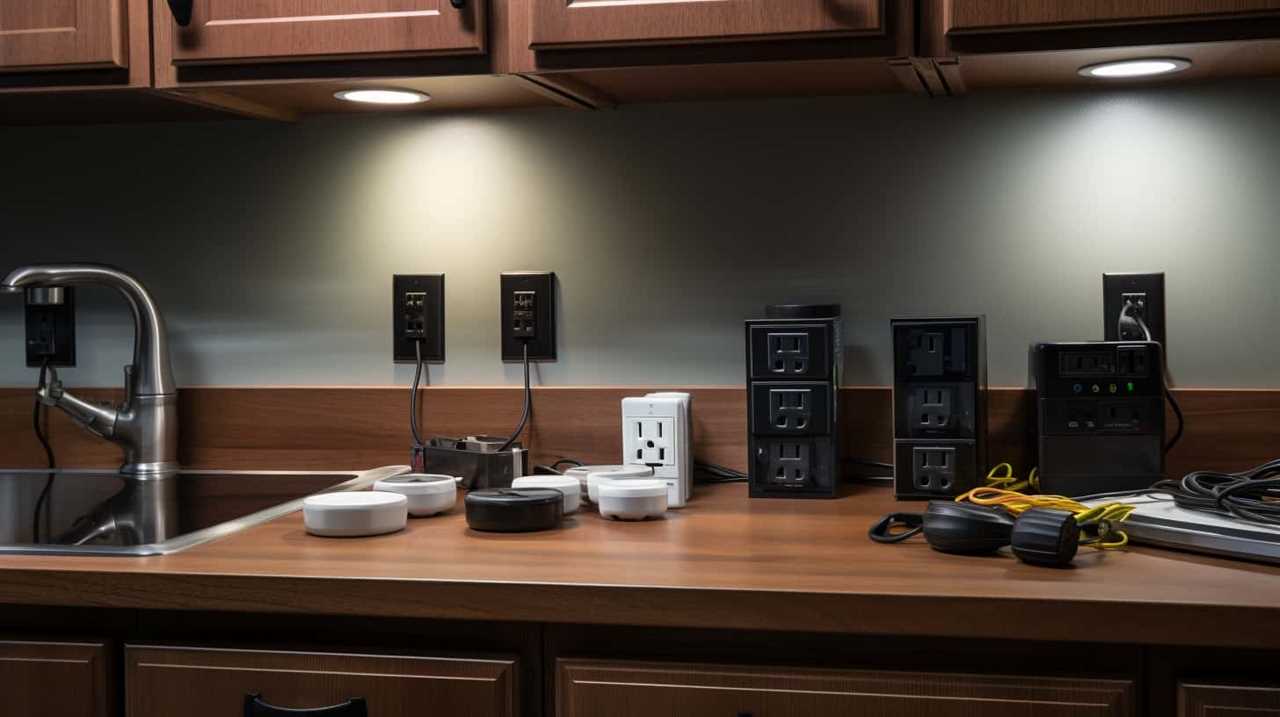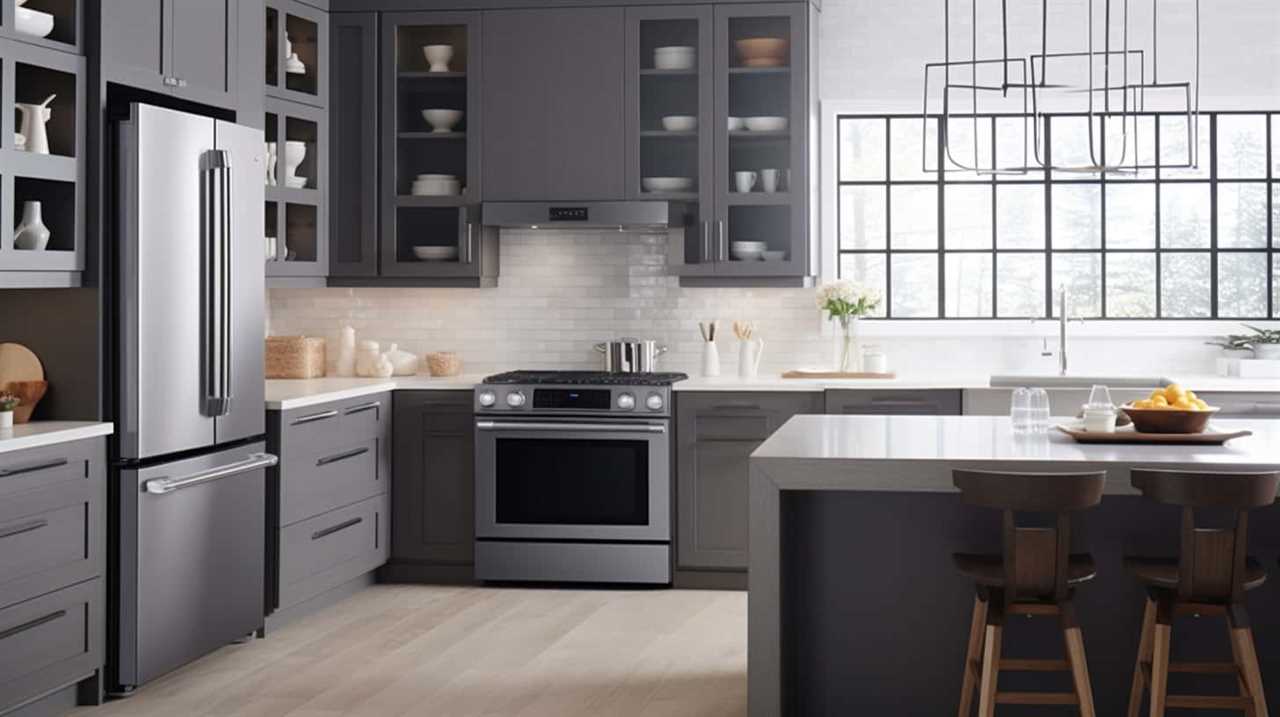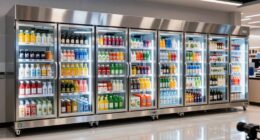We understand the struggle – the stress of effectively running a warehouse while meeting strict deadlines.
That’s why we’re here to shed light on warehouse appliances. These powerful tools are designed to streamline operations, maximize productivity, and optimize space utilization.
From forklifts to automated picking systems, we’ll delve into the types, functions, and benefits of these indispensable devices.
So, join us as we explore the world of warehouse appliances and discover how they can revolutionize your operations.

Key Takeaways
- Warehouse appliances are specialized tools and equipment used in the storage, handling, and management of goods within a warehouse setting.
- They offer numerous benefits including improved speed and accuracy in handling goods, enhanced safety, and increased efficiency.
- Common warehouse appliances include forklifts, pallet jacks, and conveyor systems.
- These appliances automate repetitive tasks, reduce human error, and integrate with Warehouse Management Systems for efficient communication and coordination.
Definition of Warehouse Appliances
Warehouse appliances are specialized tools and equipment used in the storage, handling, and management of goods within a warehouse setting. These appliances offer numerous benefits that enhance efficiency and productivity.
One of the main advantages is improved speed and accuracy in handling goods. Warehouse appliances such as forklifts, pallet jacks, and conveyor systems enable quick and precise movement of products, reducing the time and effort required for manual handling. Additionally, these appliances enhance safety in the warehouse by reducing the risk of accidents and injuries associated with manual lifting and carrying.
When choosing warehouse appliances, several factors should be considered. These include the specific requirements of the warehouse, the type and volume of goods being handled, the available space, and the budget. It’s important to select appliances that are suitable for the warehouse’s needs in order to maximize efficiency and effectiveness in operations.
Types of Warehouse Appliances
Now let’s explore the various types of warehouse appliances.

Common warehouse appliances include forklifts, pallet jacks, and conveyor systems.
These appliances serve different purposes and offer unique benefits in terms of efficiency, productivity, and safety.
Understanding the benefits of specific appliances can help warehouse operators make informed decisions about which ones to invest in for their specific needs.
Common Warehouse Appliances
We commonly use forklifts, pallet jacks, and conveyor belts as essential warehouse appliances. These appliances play a crucial role in ensuring efficient and smooth operations within a warehouse. Let’s take a closer look at each of these examples:

| Warehouse Appliance | Description | Function |
|---|---|---|
| Forklift | A powered truck | Lifting and moving heavy loads |
| Pallet Jack | Hand-operated | Transporting pallets and goods |
| Conveyor Belt | Motorized belt | Moving goods along a designated path |
Forklifts, with their lifting capabilities, are ideal for stacking and moving large palletized goods. Pallet jacks, on the other hand, are perfect for maneuvering pallets in tight spaces. Conveyor belts automate the transportation process, saving time and effort. These warehouse appliances are essential for optimizing productivity and minimizing manual labor. In the subsequent section, we will explore the benefits of these specific appliances in more detail.
Benefits of Specific Appliances
To maximize efficiency and streamline operations in a warehouse, specific appliances offer a range of benefits. These appliances are designed to improve productivity and provide cost savings.
For example, automated conveyor systems can significantly increase the speed at which goods are moved within the warehouse, reducing the time it takes to fulfill orders. This leads to improved productivity as more orders can be processed in a shorter amount of time. Additionally, automated systems can help reduce labor costs by minimizing the need for manual handling of goods.
Warehouse management systems, on the other hand, enable real-time tracking and monitoring of inventory, ensuring accurate stock levels and minimizing the risk of stockouts. By avoiding stockouts, warehouses can avoid costly delays and maintain customer satisfaction.

Key Functions of Warehouse Appliances
Warehouse appliances play a crucial role in enhancing the efficiency of warehouse operations.
By automating various tasks, these appliances help streamline processes and reduce manual labor, leading to increased productivity and accuracy.
With their ability to handle repetitive and time-consuming tasks, warehouse appliances enable businesses to optimize their operations and improve overall efficiency.
Efficiency of Warehouse Appliances
Maximizing the efficiency of warehouse appliances is crucial for optimizing operational productivity and streamlining inventory management. To ensure cost effectiveness and improvement opportunities, warehouse appliances perform key functions that enhance their efficiency:

- Automated Processes: Warehouse appliances are designed to automate repetitive tasks such as picking, sorting, and packing. This reduces human error and increases overall efficiency.
- Real-time Data Collection: These appliances are equipped with advanced sensors and software that enable real-time data collection. This information can be utilized for inventory tracking, demand forecasting, and process optimization.
- Integration with Warehouse Management Systems (WMS): Warehouse appliances seamlessly integrate with WMS, allowing for efficient communication and coordination between different systems. This integration minimizes delays and enhances overall operational efficiency.
- Energy Efficiency: Warehouse appliances are designed to be energy-efficient, reducing operational costs and environmental impact. This includes features such as energy-saving modes and smart power management systems.
Automation in Warehouse Operations
Improving operational efficiency in warehouse operations involves harnessing the key functions of warehouse appliances, particularly their automation capabilities. Automation in inventory management is a vital aspect of warehouse operations as it streamlines and optimizes the processes involved in managing inventory. By utilizing automation, warehouse appliances can effectively track and monitor inventory levels, ensuring accurate stock control and reducing the risk of stockouts or overstocking. This automation also enables real-time visibility of inventory, allowing for timely replenishment and efficient order fulfillment. The impact of warehouse appliances on labor costs is significant. With automation, tasks such as picking, packing, and inventory counting can be performed more quickly and accurately, reducing the need for manual labor and ultimately cutting down on labor costs.
| Automation in Inventory Management | Impact of Warehouse Appliances on Labor Costs |
|---|---|
| Streamlines inventory processes | Reduces the need for manual labor |
| Ensures accurate stock control | Cuts down on labor costs |
| Enables real-time inventory visibility | Increases operational efficiency |
| Facilitates timely replenishment | Optimizes order fulfillment |
Benefits of Using Warehouse Appliances
How can using warehouse appliances enhance our operations?
There are several advantages to incorporating warehouse appliances into our operations. Here are four benefits to consider:
- Increased efficiency: By utilizing warehouse appliances, we can automate repetitive tasks, such as picking and packing, leading to improved productivity and reduced labor costs.
- Enhanced accuracy: Warehouse appliances, such as automated picking systems, minimize human errors, ensuring accurate order fulfillment and reducing the likelihood of costly mistakes.
- Improved safety: With the use of warehouse appliances, we can minimize the risk of workplace accidents and injuries by automating manual handling tasks and implementing safety features.
- Scalability: Warehouse appliances offer the flexibility to scale up or down operations as needed, enabling us to adapt quickly to changing market demands and business growth.
Considering these advantages, it’s crucial to carefully evaluate various factors when choosing warehouse appliances to ensure optimal performance and suitability for our specific operational needs.

Factors to Consider When Choosing Warehouse Appliances
When choosing warehouse appliances, we need to consider several factors to ensure their optimal performance and suitability for our specific operational needs.
One of the key factors to consider is the capacity of the appliance. It’s important to choose an appliance that can handle the volume of goods that need to be stored or moved within the warehouse.
Another factor to consider is the type of goods that will be handled. Different appliances are designed for specific types of goods, such as perishable items or fragile goods.
Additionally, the efficiency and speed of the appliance are important considerations, as they can significantly impact productivity in the warehouse.

Lastly, it’s important to consider the maintenance and repair requirements of the appliance, as well as the availability of spare parts.
Future Trends in Warehouse Appliances
As we look ahead, we anticipate advancements in warehouse appliances that will revolutionize the way we handle and store goods. The future technology in warehouse appliances is set to have a significant impact on the supply chain. Here are four future trends that will shape the industry:
- Automation: With the advancement of technology, we can expect to see more automated warehouse appliances. These appliances will be equipped with artificial intelligence and machine learning capabilities, allowing them to perform tasks independently and efficiently.
- Robotics: The use of robots in warehouses is already gaining momentum, and this trend is only expected to grow. Robots will be able to handle various tasks, such as picking and packing, inventory management, and even transportation within the warehouse.
- Internet of Things (IoT): IoT will play a crucial role in future warehouse appliances. By connecting appliances and devices through a network, warehouses will have real-time visibility of inventory, enhanced tracking capabilities, and improved overall efficiency.
- Predictive Analytics: Warehouse appliances will be equipped with advanced analytics capabilities, allowing them to predict demand patterns, optimize inventory levels, and streamline operations. This will result in reduced costs, improved customer satisfaction, and better decision-making.
These future trends in warehouse appliances will undoubtedly transform the way we operate supply chains, making them more efficient, cost-effective, and responsive to customer needs.
Frequently Asked Questions
Are Warehouse Appliances Only Used in Large-Scale Warehouses, or Can They Also Be Beneficial for Smaller Warehouses?
Warehouse appliances can be beneficial for smaller warehouses as well as large-scale ones. They offer cost effectiveness and improve efficiency in managing inventory, picking and packing, and overall warehouse operations.

How Do Warehouse Appliances Improve Efficiency and Productivity in Warehouse Operations?
Warehouse appliances play a crucial role in streamlining warehouse operations. Through automation, they enhance efficiency and productivity. Case studies highlight their success in improving inventory management, order fulfillment, and overall operational effectiveness.
Are There Any Specific Industries That Can Benefit the Most From Using Warehouse Appliances?
There are specific industries that can benefit the most from using warehouse appliances. However, it is important to consider potential drawbacks such as initial costs and training requirements.
Can Warehouse Appliances Be Integrated With Existing Warehouse Management Systems?
Integrating warehouse appliances with existing systems can pose challenges. Best practices include ensuring compatibility, conducting thorough testing, and providing training for personnel. This ensures a seamless integration and maximizes the benefits of these appliances.
What Are the Potential Drawbacks or Limitations of Using Warehouse Appliances?
There are potential challenges and limitations when using warehouse appliances. However, alternative solutions can be explored to overcome these obstacles and optimize warehouse operations.

Conclusion
In conclusion, warehouse appliances play a crucial role in optimizing warehouse operations. They efficiently manage inventory, streamline processes, and improve productivity.
By automating tasks and utilizing advanced technologies, these appliances help businesses enhance their overall efficiency and accuracy.
As the demand for efficient warehouse management continues to grow, it’s essential for businesses to carefully consider their needs. They need to choose the right warehouse appliances that align with their objectives.
In this fast-paced world, warehouse appliances are the gears that keep the supply chain machinery running smoothly.










